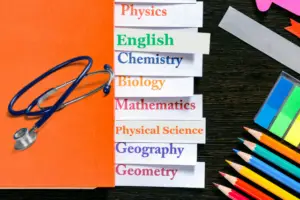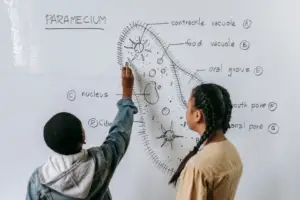Do you want to study to become a doctor in South Africa? Here are the core subjects needed.

Introduction
The number of students in South Africa, opting to study medicine is increasing on a daily basis. With strict screening, the chances of getting admission to study Medicine in South Africa gets slimmer everyday, thus, making the process very challenging.
The journey to becoming a doctor is a profound one, marked by a rigorous educational path that equips individuals with the knowledge and skills to treat and care for others.
At the heart of this journey lie the foundational subjects that form the bedrock of medical education. Bearing this in mind, it is not enough to have a dream to become a Medical Doctor. For parents whose norm is to compel their children to choose a career in Medicine for wrong and selfish reasons, do you know the requirements to become a Doctor?
As an undergraduate, being fully responsible for my admission processing exposed me to the intricacies of admission. A lot of times, student’s without proper guidance while in High School/Secondary school encounter numerous challenges during admission and most of these challenges point to wrong subject combinations.
It is important to understand that every course has its subject requirements which must be met by every applicant. For those who desire to venture into the Medical field to become Doctors, your subject combination can not be compromised. Worthy of note, preparing for medical school starts in your final year of high school.
According to Careerportal [2], to be eligible for the MBChB program, you must pass Grade 12, and your subjects must include English, Mathematics, Physics/Chemistry, and Life Science. You must enroll and pass these subjects in grade 12 to be eligible to study this 6 years course in South Africa. Most universities prioritize applicants with an academic average ranging from 75% and above in Grade 12.
Are you wondering why this is non-negotiable? Medicine is a very delicate profession that a slight mistake can cost a life. These subjects not only shape your understanding of the human body and its intricate functions but also cultivate the analytical, critical thinking, and problem-solving abilities that are crucial for success in the medical field.
In this article, we will be identifying the essential subjects required to embark on the noble journey of becoming a doctor in South Africa.
Compulsory Subjects Needed to Become a Doctor in South Africa
Without further ado, below are compulsory subjects [1] needed to become a Doctor in South Africa:
1. English
It is already established that enrolling in the right subjects is the first step to becoming a doctor in South Africa. But then, you will have to enroll at least Seven Subjects, 4 compulsory and 3 optional. Out of the 4 compulsories, 2 are any of the Eleven languages in South Africa of which English is included. Since English is the main language used in most South African Universities, it is recommended to be taken alongside any other African language.
Beyond this reason, effective communication skills are essential for medical professionals, and English proficiency is pivotal in this regard. Doctors must convey complex medical information clearly to patients, collaborate with colleagues, and document patient histories accurately. Medical literature, research articles, and patient records are often in English. Mastery of the language ensures that medical professionals can effectively communicate with diverse patients, establish trust, and ensure the accurate transfer of medical knowledge.
As an aspiring Doctor, you need to pass this subject well before being admitted into a medical school.
2. Mathematics
This is a compulsory subject that you need to select and pass in high school if you aim to be a Doctor. A solid foundation in Mathematics is important for understanding medical research and calculations.
Medical research often involves statistical analysis, and doctors must interpret numerical data accurately to make informed decisions. From calculating medication dosages to interpreting diagnostic test results, mathematical skills are indispensable. Moreover, mathematics cultivates logical reasoning and problem-solving abilities, enabling doctors to approach complex medical challenges with a systematic and analytical mindset.
3. Physics

Physics is one of the subjects under physical sciences that you must offer before attending medical school.
Physics unveils the fundamental laws that govern the physical world, including the human body. From the mechanics of human movement to the principles behind medical imaging techniques like X-rays and MRI, physics provides the framework for comprehending the physical aspects of medicine. Understanding concepts such as energy, force, and radiation is inevitable for diagnosing conditions, performing surgeries, and interpreting medical images accurately. Moreover, physics lends insight into the behavior of sound waves, allowing doctors to use ultrasound for imaging and diagnostics
The subject therefore, helps medical practitioners in protecting people from ionizing and non-ionizing radiation hazards. In South Africa, Physics is highly required to become a certified medical practitioner.
4. Chemistry

Chemistry is a cornerstone subject that provides aspiring doctors with a profound understanding of the molecular world that constitutes life. The study of organic and inorganic chemistry equips medical students with insights into the structure and function of biomolecules, the mechanisms of enzymatic reactions, and the properties of drugs and medications. A solid foundation in chemistry enables doctors to understand drug interactions, design pharmaceutical agents, and interpret the chemical processes that occur within the human body.
Furthermore, with the help of Chemistry, medical practitioners can develop new drugs and analyze new compounds. Additionally, understanding the principles of biochemistry is crucial for grasping diseases at the molecular level and designing targeted therapeutic interventions. Also, it contributes to the medical surgery aspect. The subject is employed when preparing and using surgical instruments. The knowledge of chemistry is important for medical aspirants.
5. Biology/Life Sciences

Life Sciences, particularly Biology is a core subject that provides the foundational knowledge of living organisms, human anatomy, and physiology
You must study and pass biology before you are accepted in any South African medical school.
Biology forms the cornerstone of medical education. It provides a deep understanding of human anatomy, physiology, genetics, and cellular processes. Without this knowledge, doctors would lack the insight necessary to diagnose illnesses accurately, design effective treatments, and understand the function of various bodily systems. Life Sciences foster an appreciation for the intricacies of life, enabling doctors to approach patient care holistically and make informed medical decisions.
Conclusion
The subjects required to become a doctor in South Africa represent the cornerstone of a comprehensive education that empowers individuals to enter the medical field with confidence, competence, and a deep understanding of the human body and its complexities. The fusion of subjects like Mathematics, Physical Sciences, Life Sciences, and English enables aspiring doctors to bridge the gap between scientific knowledge and compassionate patient care. The subject also collectively nurture critical thinking, analytical prowess, an understanding of human biology, and effective communication abilities
As these future medical professionals embark on their educational journey, armed with these subjects, they embark on a path that not only requires intellectual acumen but also embodies the spirit of service and dedication to the well-being of society. Through their unwavering commitment to mastering these subjects,
they are poised to make a meaningful impact on the lives they touch and the healthcare landscape of South Africa.
However, keep in mind that specific medical schools might have slightly different requirements, so it’s important to check with the schools you’re interested in to confirm their exact subject prerequisites.
References
[1] Khumalo, Vusi. “Requirements to Study Medicine in South Africa (2023).” South Africa Lists, 9 Feb. 2023, https://southafricalists.com/requirements-to-study-medicine-in-south-africa/.
[2] Careersportal.Co.Za, https://www.careersportal.co.za/careers/how-to-become-a-doctor-in-south-africa.
Don’t miss out on current updates, kindly like us on Facebook & follow us on Follow @EAfinder OR leave a comment below for further inquiries







